过去分词短语做状语
- 格式:doc
- 大小:26.00 KB
- 文档页数:4
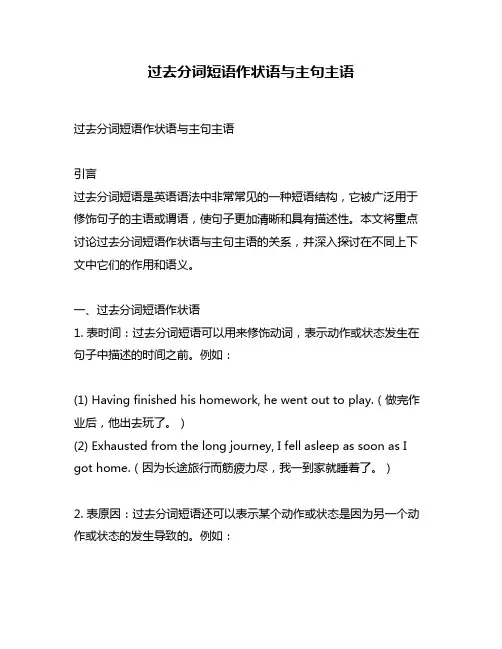
过去分词短语作状语与主句主语过去分词短语作状语与主句主语引言过去分词短语是英语语法中非常常见的一种短语结构,它被广泛用于修饰句子的主语或谓语,使句子更加清晰和具有描述性。
本文将重点讨论过去分词短语作状语与主句主语的关系,并深入探讨在不同上下文中它们的作用和语义。
一、过去分词短语作状语1. 表时间:过去分词短语可以用来修饰动词,表示动作或状态发生在句子中描述的时间之前。
例如:(1) Having finished his homework, he went out to play.(做完作业后,他出去玩了。
)(2) Exhausted from the long journey, I fell asleep as soon as I got home.(因为长途旅行而筋疲力尽,我一到家就睡着了。
)2. 表原因:过去分词短语还可以表示某个动作或状态是因为另一个动作或状态的发生导致的。
例如:(1) She missed the bus, being late for work.(她错过了公交车,因为迟到上班。
)(2) The team lost the match, having made too many mistakes.(由于犯了太多错误,队伍输掉了比赛。
)3. 表方式:过去分词短语可以描述动作的方式或方式。
例如:(1) He drove the car, carefully avoiding any obstacles.(他小心地开车,避开了任何障碍。
)(2) She completed the project, skillfully using her knowledge.(她运用自己的知识,熟练地完成了项目。
)二、过去分词短语作主句主语过去分词短语还可以作为主句的主语,这时它在句子中扮演的角色更加突出,通常表示被动或完成的动作。
1. 表示被动:过去分词短语作为主句主语时,通常表示主语所受到的动作或影响。
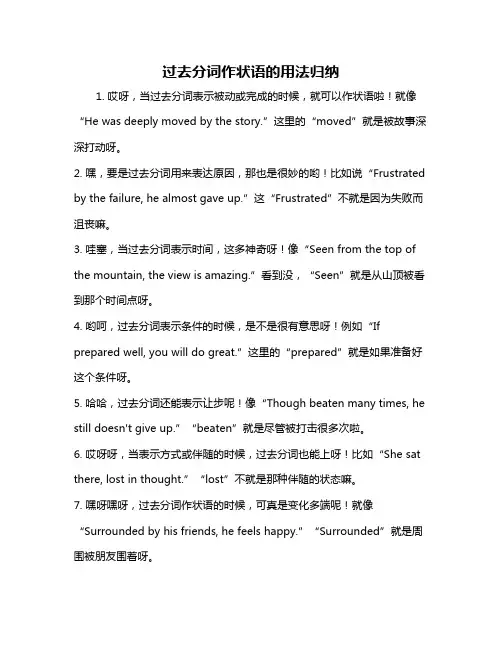
过去分词作状语的用法归纳
1. 哎呀,当过去分词表示被动或完成的时候,就可以作状语啦!就像“He was deeply moved by the story.”这里的“moved”就是被故事深深打动呀。
2. 嘿,要是过去分词用来表达原因,那也是很妙的哟!比如说“Frustrated by the failure, he almost gave up.”这“Frustrated”不就是因为失败而沮丧嘛。
3. 哇塞,当过去分词表示时间,这多神奇呀!像“Seen from the top of the mountain, the view is amazing.”看到没,“Seen”就是从山顶被看到那个时间点呀。
4. 哟呵,过去分词表示条件的时候,是不是很有意思呀!例如“If prepared well, you will do great.”这里的“prepared”就是如果准备好这个条件呀。
5. 哈哈,过去分词还能表示让步呢!像“Though beaten many times, he still doesn't give up.”“beaten”就是尽管被打击很多次啦。
6. 哎呀呀,当表示方式或伴随的时候,过去分词也能上呀!比如“She sat there, lost in thought.”“lost”不就是那种伴随的状态嘛。
7. 嘿呀嘿呀,过去分词作状语的时候,可真是变化多端呢!就像“Surrounded by his friends, he feels happy.”“Surrounded”就是周围被朋友围着呀。
8. 哇哦,过去分词这么有用,大家可得好好掌握呀!
总之,过去分词作状语的用法很多,大家要多多练习,才能运用自如呀!。
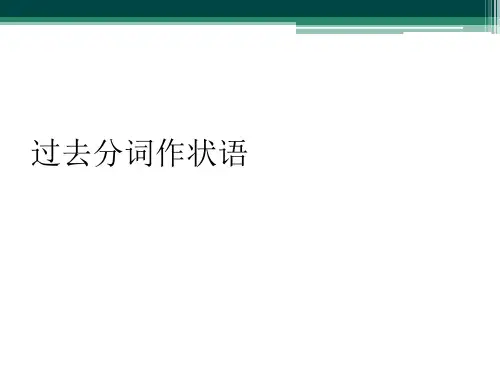
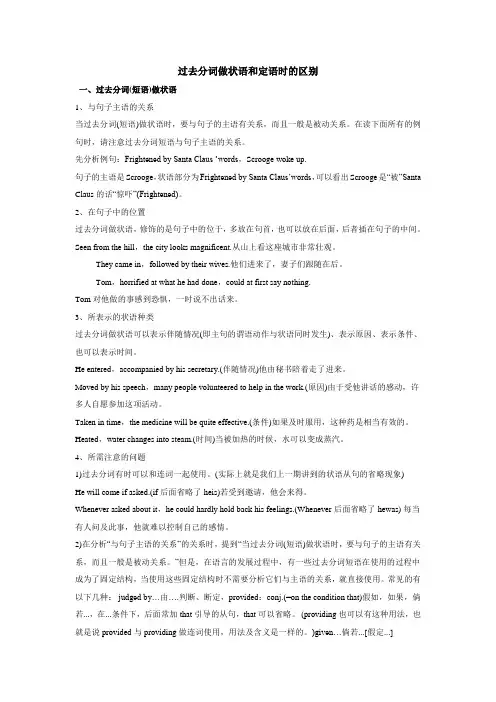
过去分词做状语和定语时的区别一、过去分词(短语)做状语1、与句子主语的关系当过去分词(短语)做状语时,要与句子的主语有关系,而且一般是被动关系。
在读下面所有的例句时,请注意过去分词短语与句子主语的关系。
先分析例句:Frightened by Santa Claus …words,Scrooge woke up.句子的主语是Scrooge,状语部分为Frightened by Santa Claus‟words,可以看出Scrooge是“被”Santa Claus的话“惊吓”(Frightened)。
2、在句子中的位置过去分词做状语,修饰的是句子中的位于,多放在句首,也可以放在后面,后者插在句子的中间。
Seen from the hill,the city looks magnificent.从山上看这座城市非常壮观。
They came in,followed by their wives.他们进来了,妻子们跟随在后。
Tom,horrified at what he had done,could at first say nothing.Tom对他做的事感到恐惧,一时说不出话来。
3、所表示的状语种类过去分词做状语可以表示伴随情况(即主句的谓语动作与状语同时发生)、表示原因、表示条件、也可以表示时间。
He entered,accompanied by his secretary.(伴随情况)他由秘书陪着走了进来。
Moved by his speech,many people volunteered to help in the work.(原因)由于受他讲话的感动,许多人自愿参加这项活动。
Taken in time,the medicine will be quite effective.(条件)如果及时服用,这种药是相当有效的。
Heated,water changes into steam.(时间)当被加热的时候,水可以变成蒸汽。
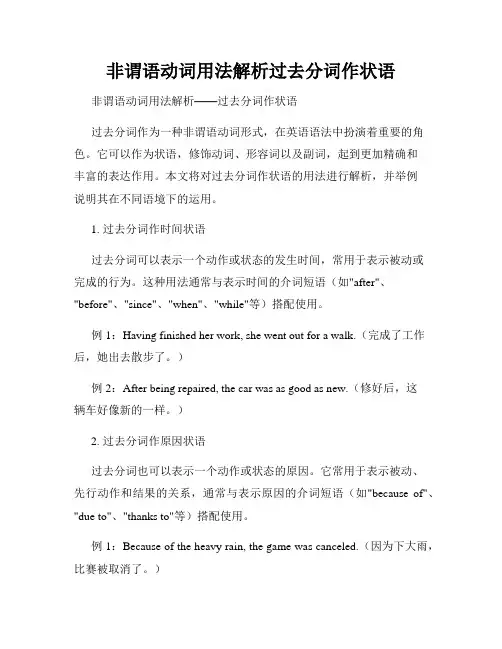
非谓语动词用法解析过去分词作状语非谓语动词用法解析——过去分词作状语过去分词作为一种非谓语动词形式,在英语语法中扮演着重要的角色。
它可以作为状语,修饰动词、形容词以及副词,起到更加精确和丰富的表达作用。
本文将对过去分词作状语的用法进行解析,并举例说明其在不同语境下的运用。
1. 过去分词作时间状语过去分词可以表示一个动作或状态的发生时间,常用于表示被动或完成的行为。
这种用法通常与表示时间的介词短语(如"after"、"before"、"since"、"when"、"while"等)搭配使用。
例1:Having finished her work, she went out for a walk.(完成了工作后,她出去散步了。
)例2:After being repaired, the car was as good as new.(修好后,这辆车好像新的一样。
)2. 过去分词作原因状语过去分词也可以表示一个动作或状态的原因。
它常用于表示被动、先行动作和结果的关系,通常与表示原因的介词短语(如"because of"、"due to"、"thanks to"等)搭配使用。
例1:Because of the heavy rain, the game was canceled.(因为下大雨,比赛被取消了。
)例2:Due to his hard work, he achieved great success.(由于他的努力,他取得了巨大的成功。
)3. 过去分词作方式状语过去分词还可以表示一个动作的方式或方式。
它常与表示方式的介词短语(如"by")或连词(如"as")搭配使用。
例1:He won the race by running faster than others.(他通过比其他人跑得更快赢得了比赛。
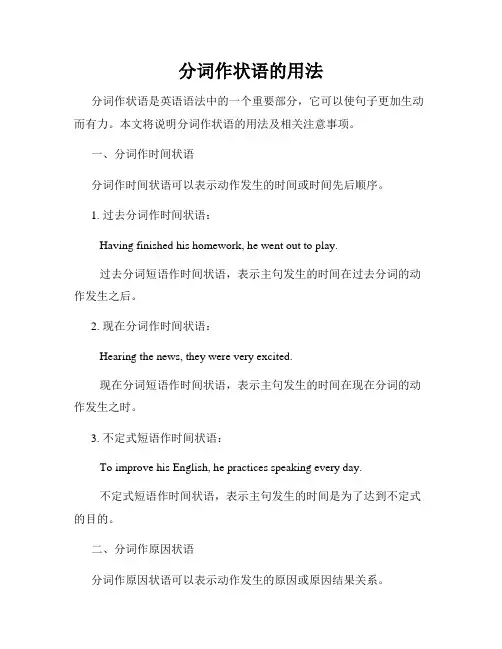
分词作状语的用法分词作状语是英语语法中的一个重要部分,它可以使句子更加生动而有力。
本文将说明分词作状语的用法及相关注意事项。
一、分词作时间状语分词作时间状语可以表示动作发生的时间或时间先后顺序。
1. 过去分词作时间状语:Having finished his homework, he went out to play.过去分词短语作时间状语,表示主句发生的时间在过去分词的动作发生之后。
2. 现在分词作时间状语:Hearing the news, they were very excited.现在分词短语作时间状语,表示主句发生的时间在现在分词的动作发生之时。
3. 不定式短语作时间状语:To improve his English, he practices speaking every day.不定式短语作时间状语,表示主句发生的时间是为了达到不定式的目的。
二、分词作原因状语分词作原因状语可以表示动作发生的原因或原因结果关系。
1. 过去分词作原因状语:Being tired, she decided to go to bed early.过去分词短语作原因状语,表示主句发生的原因是过去分词的动作。
2. 现在分词作原因状语:Seeing the dark clouds, they decided to bring umbrellas.现在分词短语作原因状语,表示主句发生的原因是现在分词的动作。
3. 不定式短语作原因状语:To save money, he stopped eating out.不定式短语作原因状语,表示主句发生的原因是不定式的目的。
三、分词作条件状语分词作条件状语可以表示动作发生的条件或条件结果关系。
1. 过去分词作条件状语:Given the chance, he would travel around the world.过去分词短语作条件状语,表示主句发生的条件是过去分词的动作。
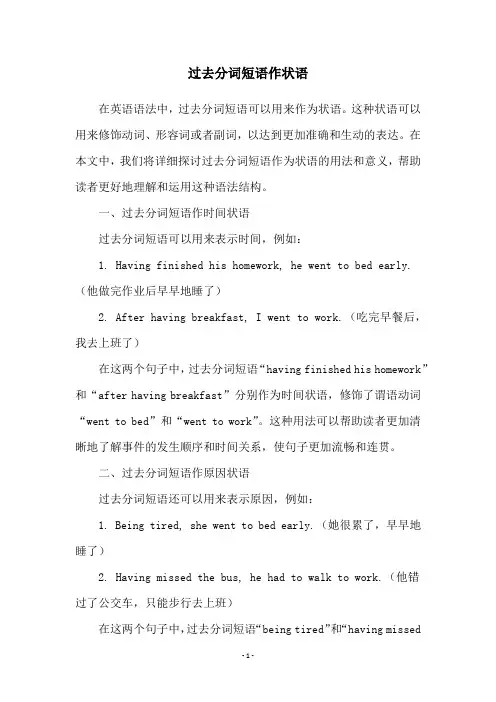
过去分词短语作状语在英语语法中,过去分词短语可以用来作为状语。
这种状语可以用来修饰动词、形容词或者副词,以达到更加准确和生动的表达。
在本文中,我们将详细探讨过去分词短语作为状语的用法和意义,帮助读者更好地理解和运用这种语法结构。
一、过去分词短语作时间状语过去分词短语可以用来表示时间,例如:1. Having finished his homework, he went to bed early.(他做完作业后早早地睡了)2. After having breakfast, I went to work.(吃完早餐后,我去上班了)在这两个句子中,过去分词短语“having finished his homework”和“after having breakfast”分别作为时间状语,修饰了谓语动词“went to bed”和“went to work”。
这种用法可以帮助读者更加清晰地了解事件的发生顺序和时间关系,使句子更加流畅和连贯。
二、过去分词短语作原因状语过去分词短语还可以用来表示原因,例如:1. Being tired, she went to bed early.(她很累了,早早地睡了)2. Having missed the bus, he had to walk to work.(他错过了公交车,只能步行去上班)在这两个句子中,过去分词短语“being tired”和“having missedthe bus”分别作为原因状语,说明了主语行动的原因。
这种用法可以让读者更加清晰地了解事件的因果关系,使句子更加有逻辑性和连贯性。
三、过去分词短语作条件状语过去分词短语还可以用来表示条件,例如:1. Given the circumstances, we had no choice but to cancel the event.(鉴于情况,我们别无选择,只能取消活动了)2. Knowing the truth, he decided to tell the police.(知道真相后,他决定向警方报告)在这两个句子中,过去分词短语“given the circumstances”和“knowing the truth”分别作为条件状语,说明了主语行动的条件。
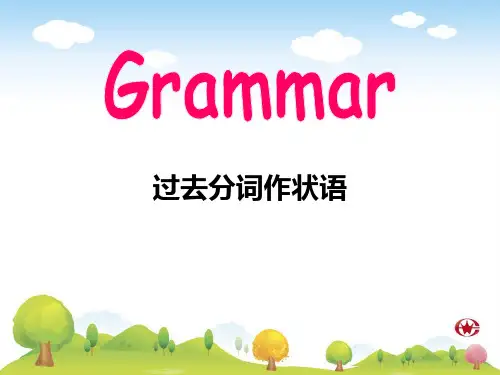
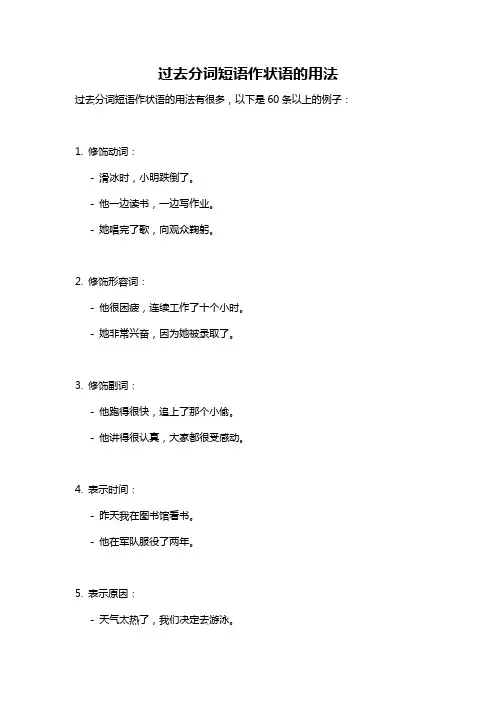
过去分词短语作状语的用法过去分词短语作状语的用法有很多,以下是60条以上的例子:1. 修饰动词:- 滑冰时,小明跌倒了。
- 他一边读书,一边写作业。
- 她唱完了歌,向观众鞠躬。
2. 修饰形容词:- 他很困疲,连续工作了十个小时。
- 她非常兴奋,因为她被录取了。
3. 修饰副词:- 他跑得很快,追上了那个小偷。
- 他讲得很认真,大家都很受感动。
4. 表示时间:- 昨天我在图书馆看书。
- 他在军队服役了两年。
5. 表示原因:- 天气太热了,我们决定去游泳。
- 因为过去常常下雨,他没有收获到很多庄稼。
6. 表示结果:- 摔跤后,他的腿受伤了。
- 长时间的用眼使她的视力变差了。
7. 表示条件:- 如果得了好成绩,他们就会给她一个奖学金。
- 假如你赢了比赛,我会带你去庆祝。
8. 表示让步:- 尽管难以置信,他们完成了任务。
- 即使生活各方面都很困难,他也从未放弃。
9. 表示方式:- 他小声地说,以免被听到。
- 警察把他粗暴地逮捕起来。
10. 表示伴随:- 我们一起坐在海滩上看着日落。
- 在音乐声中,他们舞蹈了一整晚。
11. 表示目的:- 他去邮局寄信。
- 我们买了一些食物,为了备不时之需。
12. 表示程度:- 晚餐做得很好,大家都吃得很饱。
- 雨下得很大,我们都淋湿了。
13. 表示顺序:- 他按照指示一步一步地进行。
- 他按照说明书安装了电视。
14. 表示比较:- 她比我学得更快。
- 这部电影比预期更好看。
15. 表示条件:- 假如你想要通过考试,你就需要努力学习。
- 如果下雨,我们就会取消野餐计划。
16. 表示结果:- 失去工作,他变得沮丧。
- 她的努力得到了回报。
17. 表示时间:- 经历了许多困难,他终于实现了梦想。
- 她看了一会电视,然后出去散步。
18. 表示原因:- 由于道路交通拥堵,我们迟到了。
- 风大得让树都被吹倒了。
19. 表示让步:- 尽管工作很忙,他还是找时间陪孩子。
- 即使受伤了,他仍然坚持比赛。
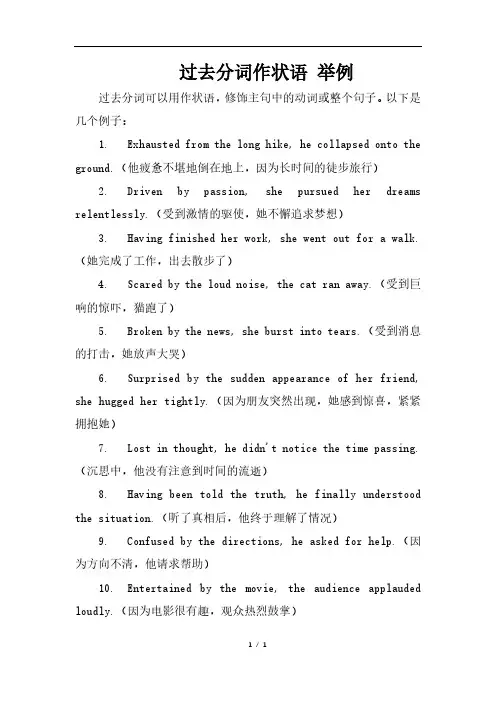
过去分词作状语举例过去分词可以用作状语,修饰主句中的动词或整个句子。
以下是几个例子:1. Exhausted from the long hike, he collapsed onto the ground.(他疲惫不堪地倒在地上,因为长时间的徒步旅行)2. Driven by passion, she pursued her dreams relentlessly.(受到激情的驱使,她不懈追求梦想)3. Having finished her work, she went out for a walk.(她完成了工作,出去散步了)4. Scared by the loud noise, the cat ran away.(受到巨响的惊吓,猫跑了)5. Broken by the news, she burst into tears.(受到消息的打击,她放声大哭)6. Surprised by the sudden appearance of her friend, she hugged her tightly.(因为朋友突然出现,她感到惊喜,紧紧拥抱她)7. Lost in thought, he didn't notice the time passing.(沉思中,他没有注意到时间的流逝)8. Having been told the truth, he finally understood the situation.(听了真相后,他终于理解了情况)9. Confused by the directions, he asked for help.(因为方向不清,他请求帮助)10. Entertained by the movie, the audience applauded loudly.(因为电影很有趣,观众热烈鼓掌)1/ 1。

过去分词作状语用法归纳一、过去分词(短语)作状语时,其逻辑主语通常就是句子的主语。
过去分词(短语)作状语一般都用逗号同其它成分隔开。
1. 作时间状语时,可转换为when或while等引导的从句,通常放在句首。
如:Seen from the top of the hill (= When it is seen from the top of the hill), the school looks like a big garden.2. 作条件状语时,可转换为once, if或unless等引导的从句,一般放在句首。
如:Given more attention (= If it was given more attention), the fire could have been avoided.3. 作原因状语时,可转换为because, as或since等引导的从句,多放在句首。
如:Encouraged (= As she was encouraged) by the teacher, the girl was very happy.4. 作让步状语时,可转换为though, although 或even if引导的从句,常放在句首。
如:Left (= Although she was left) alone at home, Jenny didn’t feel afraid at all.5. 作方式或伴随状语时,常可转换为并列分句,可位于句首或句末。
如:Surrounded by his students, the teacher went into the lab. (= The teacher was surrounded by his students and he went into the lab.)6. 过去分词(短语)作状语时,有时为了强调,前面可带连词when, while, if, though, as if, unless等。
什么时候过去分词作状语
过去分词作状语是中文中的一种语法现象,它在句子中充当状语,用来表示主语动作的时间、原因、条件、方式、结果等,起到修饰动
词的作用。
它可以单独出现在句子中,也可以和连词“当…时,一…就…”连用。
在句子中,过去分词作状语时,通常表示的是已经发生的动作或
状态。
它可以表示时间的先后顺序、因果关系、条件关系、目的等。
当过去分词作时间状语时,可以表示的时间可以是过去、现在甚至是
将来。
在句子中,过去分词作状语可以使用不限于“看到、听到、了
解到、了解到、了解到、了解到、了解到、了解到、了解到、了解到、了解到发现、要求…等”
比如:
1.我走过去一看,他已经离开了。
2.我听说他进了医院,我立刻赶了过去。
3.他做完作业就去打篮球了。
4.太阳落山的时候,他还在工作。
过去分词作状语的句子有时候也可以通过改变主语的位置,将过
去分词置于主语之后,这样可以加强句子的逻辑关系,使句子更通顺。
这种句型通常通过“由于、因为、尽管、虽然、当…时,一…就…”
等连词连接。
比如:
1.由于工作繁忙,他常常加班到很晚。
2.因为生病了,他没能参加聚会。
3.虽然下雨了,但他照样去了操场。
总之,过去分词作状语是中文语法中的一种重要现象,它通过修
饰动词,增强了句子的信息量,使句子更加丰富和生动。
在写作中,
我们可以通过增加过去分词作状语的句式结构,使句子更加多样化,
达到丰富语言表达的目的。
过去分词作状语的用法归纳过去分词或过去分词短语作状语时,表示被动和完成,在句子中一般可以作时间、原因等。
1.时间状语Told that his mother was ill, Li Lei hurried home quickly. 李蕾得知母亲生病了时,马上赶回了家。
Seen from the moon, the earth looks green. 从月亮上看时,地球是绿色。
2.原因状语Broken down on the high way, his car was carried away by the police. 由于他的车在高速公路上坏了,于是被警察拖走了。
Satisfied with what he did, the teacher praised him in class. 由于老师对他所做的事情很满意,于是在班上表扬了他。
3.条件状语Given a few minutes, I’ll finish it. 再给几分钟的时间,我就会完成了。
Compared with you, I still have a long way to go. 跟你比较起来,我还差得很远呢。
4.让步状语Explained a hundred times, he still can’t understand it. 即使给他解释一百篇,她还是不会明白。
Trained ten hours a day, he will still be a fool. 即使每天训练十个小时,他也还会是个傻瓜。
5.结果状语He fell off a tall tree, died. 他从树上摔了下来,死了(from )。
The cup fell down to the ground, broken. 茶杯掉到了地上,破碎了。
注意:一般来说,不论是动词不定式作状语、-ing分词做状语,还是动词的过去分词作状语,其逻辑主语必须是句子的主语。
非谓语动词:过去分词过去分词短语作状语过去分词表示完成或被动,作状语时,表示动作发生的背景或者情况,在意义上相当于一个状语从句,其省略的主语逻辑主语是主句的主语,且与主语之间存在被动关系;过去分词作状语可以表示时间、条件、方式、原因、让步等;过去分词的否定式是将not放在其前面;一、过去分词作状语时的具体用法:1)过去分词作时间状语时,相当于一个时间状语从句;有时过去分词前可加连词when或while来强调时间概念.例:1. Asked When he was asked what had happened, his face turned red.当他被问及发生了什么的时候,他的脸红了;2. When heated When it is heated, water changes into steam. 当加热时,水变成水蒸气;3.Told that his mother was illWhen he was told that his mother was illl, Li Lei hurried homequickly. 李蕾得知母亲生病了时,马上赶回了家;4. Seen from the moonWhen it is seen from the moon , the earth looks green. 从月亮上看时,地球是绿色;2)过去分词作原因状语时,相当于一个由as, since, because等词引导的原因状语从句;例:1. Deeply Because they were moved by the movie, the children began to cry.由于被电影深深地感动,孩子们哭了起来;2. Frightened Because she was frightened by the horror movie, the girl didn't dare to sleepalone. 因为被惊悚电影吓坏了,这个女孩不敢单独睡觉;3. Caught in a heavy rain Because he was caught in a..., he was all wet.4. Satisfied with what he did Because the teacher was satisfied with..., the teacherpraised him in class. 由于老师对他所做的事情很满意,于是在班上表扬了他;3)过去分词作条件状语时,通常放在句子的前面,相当于if, unless等引导的条件状语从句; 例:1. Compared with you If we are compared , we still have a long way to go.和你们比起来,我们还有很长的一段路要走;2. Grown If these seeds are grown in rich soil, these seeds can grow fast.如果种在肥沃的土壤里,这些种子能长得很快;3. Given more time If we were given more time, we would be able to do the work muchbetter.4. Given a few minutes If I am given a few minutes, I’ll finish it. 再给几分钟的时间,我就会完成了4)过去分词作让步状语时,相当于一个以though / although引导的让步状语从句,这类分词或分词短语一般放在句子前面;例:1. Left Although he was left at home, John didn't feel afraid at all.虽然John被单独留在房间里, 他一点都不害怕;2. Invited by him Though I was invited by them , I won’t take part in the party.即使被邀请,我也不会参加聚会的;3. Explained a hundred times Although he was explained... , he still can’t understand it. 即使给他解释一百篇,她还是不会明白;4.Trained ten hours a day Though he was trained..., he will still be a fool. 即使每天训练十个小时,他也还会是个傻瓜;5)过去分词作状语表方式或伴随状语时不用状语从句替换,但可以改写成并列句;例:1.She walked out of the house, and she was followed by her little daughter.她走出房子,后面跟着她小女儿;2. She was Dressed in white, and she looked really pretty.穿着白衣服,她看起来确实很美;3.She sat by the window, and she was lost in thought.二、过去分词与现在分词作状语的区别:1)过去分词表完成、被动,与主句的主语之间是被动关系;现在分词表进行、主动,与主句的主语之间是主动关系;试比较:Following the old man, we went upstairs. 跟着那个老人, 我们上了楼;= We followed the old man, and we went upstairs.Followed by the old man, we went upstairs. 我们上了楼, 后面跟着那个老人;= We were followed by the old man, and we went upstairs.Seen from the top, the stadium looks like a bird nest. 从上面看,体育场好像一个鸟巢;Seeing from space, the astronaut can not discover the Great Wall. 从太空看,宇航员看不到长城;2)若分词主语与句中主语不一致,则可以用其他方法来修正;①用with的复合结构等.②改为相应的状语从句来表达;③给分词添加自己的主语,构成独立主格结构④改变语态;例如:完成作业后,孩子们出去踢足球了;Finished their homework, the children went out to play football. ×Their homework finished, the children went out to play football. 独立主格Having finished their homework, the children went out to play football.现在分词完成形式With their homework finished表时间, the children went out to play football. with的复合结构After finishing their homework, the children went out to play football. 介词+动名词例如:当他过马路时,一辆车撞到了他;误:Crossing the road, a car knocked him down.误:Crossed the road, he was knocked down by a car.正:Crossing the road, he was knocked down by a car. 过马路时他被车撞倒了;正:When he was crossing the road, a car knocked him down. 他过马路时车子把他撞倒了; ※注意:的由来解决状语分词的逻辑主语与句子主语不一致的问题,也可在分词前加一个名词或代词,使之成为分词的逻辑主语;由于加在分词前的名词或代词要用主格形式,例:He crossing the road, a car knocked him down.The job finished, we went home. 工作结束后我们就回家了;The weather being fine, we went swimming. 天气很好,我们就去游泳了;He being absent, nothing couldn’t be done. 由于他缺席,什么事也干不成;误:Barking madly,I led the dog out.正:The dog barking madly, I led it out.正:Barking madly,the dog was let out by me.正:Becuase the dog was barkling madly, I led it out.正:With the dog barking madly, I led it out.三、有些过去分词因源于系表结构,已经被形容词化;故作状语时不表被动而表主动,表示人的状态;get lost; be lost in沉溺于;be seated; be compared withbe dressed in; be born; be tired of 厌烦; be tired from be worried about表状态be interested in; be moved by; be disappointed at; be surprised at四、选择现在分词还是过去分词,关键看主句的主语;如分词的动作是主句的主语发出,分词就选用现在分词,反之就用过去分词;Used for a long time, the book looks old. Using the book, I find it useful.Looking at her, he jumped with joy. Looked at by her, he jumped with joy.五、正如第四点所说,不论是动词不定式作状语、-ing分词做状语,还是动词的过去分词作状语,其逻辑主语必须是句子的主语;但是,有一些非谓语动词短语已经游离出来,成为单独的短语,在句子中作状语;如:1 exactly / honestly / frankly / generally speaking, 准确地说不过去/ 老实地说/ 坦率地说/ 一般说来;例:1. Exactly speaking, he got here at eight fourteen this morning. 准确地说,今天早晨他是十八点十四分来到这里的;2. Generally speaking, a snake won’t attack a man unless it is bothered. 一般说来,蛇是不会攻击人的除非你冒犯了它;2 / by... 从/ 根据某东西判断例:1. Judging by his accent, he is from Hunan. 从他的口音来判断,他是湖南人;2. Judging from what he said, he is very honest. 从他所说的话来判断,它是很诚实的;3 providing / provided …假如/ 如果例:1. Providing he follows our advice, we can help him. 要是他按我们的建议去做,我们就能帮助他;2. Provided he is free, he is sure to come. 如果他有空,他肯定会来;4 considering... 考虑到例:1. Considering he was just a little boy, we didn’t punish him. 考虑到他还只是一个小孩,我们就没有惩罚他了;2. Considering it was late, we didn’t discuss the question. 考虑到时间不早了,我们就没有讨论这个问题了;5 ... 想到/ 考虑到例:Thinking of the environment we live in, the waste can’t be thrown away around directly. 考虑到我们所生存的环境,废物不能直接到处乱扔;6 talking of... 谈到/ 说到例:Talking of math, he became excited. 谈到数学,他就兴奋起来了;此外,还有短语:taking...into consideration 把某事考虑进去;calculating roughly, 粗略地计算;supposing... 假定;to tell you the truth 实话告诉你;to be frank 坦白地说;to begin with 首先要做的是;so to speak 可以这么说;taken as a whole 从整体上来看;put frankly, 坦率地说;鉴于等;Ilearn过去分词:作状语练习Multiple Choices Given a lever, anyone can move the earth with it.1.____ into English, the sentence was found to have an entirely different word order.A.TranslatingB. TranslatedC. To translateD. Having translated2.____ the right kind of training, these teenage soccer players may one day grow into international stars.A. GivingB. Having givenC. To giveD. Given3.____ an important role in a new movie, Andy has got a chance to become famous.A. OfferB. OfferingC. OfferedD. To offer4.____ twice, the postman refused to deliver our letters unless we chained our dog.A. Being bittenB. BittenC. Having bittenD. To be bitten5.____ from the top of the tower, the south foot of the mountain is a sea of trees.A. SeenB. SeeingC. Having seenD. To see6.____ time, he’ll make a first-class tennis player.A. Having givenB. To givenC. GivingD. Given7.The island, ____ to the mainland by a bridge, is easy to go to.A. joiningB. to joinC. joinedD. having joined8.____ from this point of view, the question will be of great importance.A. ConsideringB. ConsiderC. To considerD. Considered9.When ____ through the book, I came across an interesting picture.A. lookB. lookingC. lookedD. being looked10.____ that film, I am afraid I cannot say anything about it.A. Not having seenB. Having seenC. Having been seenD. Not seen。
过去分词(短语)作状语吴国斌过去分词(短语)作状语,它的逻辑主语通常就是句子的主语,过去分词与主语之间是动宾关系,即被动关系。
过去分词(短语)作状语可以表时间、原因、条件、让步、方式或伴随情况等。
1.时间状语过去分词作时间状语,相当于一个时间状语从句。
也可在过去分词前加上连词when,while,until等,使其时间意义更明确。
Seen from the top of the hill, the city looks more beautiful=When it is seen from the top of the hill, the city looks more beautiful.从山顶看,城市显得更漂亮。
Don’t speak until asked to.=Don’t speak until you are asked to.当被要求发言时,你才能讲话。
2.原因状语过去分词作原因状语,相当于一个原因状语从句。
Encouraged by the progress he has made, he works harder.=As he is encouraged by the progress he has made, he works harder.由于受到所取得的进步的鼓励,他工作更努力了。
3.条件状语作条件状语的过去分词(短语)可转换为if,unless等引导的条件状语从句。
United we will stand; divided we will fall.=If we are united we will stand; if we are divided we will fall.团结写就是胜利,分裂必然失败。
4.让步状语作让步状语的过去分词(短语)可转换为although,though或even if/though 等引导的让步状语从句。
Though warned of the storm, the farmers were still working in the fields.=Though they had been warned of the storm, the farmers were still working in the fields.虽然农民们已被警告将有风暴,但他们仍然在地里干活。
过去分词用作状语过去分词作状语主要是说明谓语动作发生的背景或条件;表示原因、时间、条件、让步、方式或伴随情况等。
过去分词可置于主句前,也可置于主句后,用逗号与主句隔开。
1. 原因状语Choked by the heavy smoke, he could hardly breathe. 他被浓烟呛了,几乎不能呼吸了。
Caught in a heavy rain, he was all wet. 因为淋了一场大雨,所以他全身湿透了。
Frightened by the noise in the ni ght, the girl didn’t dare to sleep in her room. 受到夜晚响声的惊吓,那姑娘不敢睡在她的房间。
2. 时间状语Left to itself in the room, the baby began to cry.当被孤独地留在房间里时,婴儿哭了起来。
Asked why he did it, the monitor said it was his duty. 当被问及这件事时,班长说这是他的职责。
Approached in the dark, the lights looked lonely and purposeless. 在黑暗中走近时。
那些电灯显得孤单而无意义。
3. 条件状语Seen in this aspect, the matter isn’t as serious as people generally suppose.如果从这个角度看,问题并不像人们一般预料的那样`严重。
Grown in rich soil, these seeds can grow fast. 如果种在肥沃的土壤里,这些种子能长得很快。
Given better attention, the accident could have been avoided. 要是多加注意,那次事故就能避免了。
过去分词作状语的例句英语一.过去分词(短语)作状语表示动作发生的背景或情况,在意义上相当于一个状语从句,其逻辑主语就是句子的主语。
过去分词(短语)在句中作状语可以表示时间、条件、方式或伴随、让步、原因等。
1.表示时间:过去分词(短语)做时间状语,相当于一个时间从句。
例如:Asked about his family, he made no answer=When he was asked about his family, he made no answer.当问到有关他的家庭的情况时,他没有回答。
2.表示条件:过去分词(短语)做条件状语,相当于一个条件状语从句。
这类句子的谓语动词往往用将来时或情态动词。
例如:United, we stand;divided,we fall=If we are united,we stand;if we are divided, we fall.团结,我们就能独立;分裂,我们必然倒下。
3.表示方式或伴随:过去分词(短语)做方式或伴随状语,可以转换成一个并列句。
例如:The boy slipped out of the room, followed by his pet dog=The boy slipped out of the room and was followed by his pet dog.这个男孩溜出了房间,后面跟着他的宠物狗。
4.表示让步:过去分词(短语)做让步状语,相当于一个让步状语从句。
例如:Rejected many times, the man did not lose heart=Though the man was rejected many times, he did not lose heart.虽然被拒绝了很多次,这个人并没有失去信心。
5.表示原因:过去分词(短语)作原因状语,相当于一个原因状语从句。
例如:Seriously injured, he had to be taken to the hospital=Because he was seriously injured, he had to be taken to the hospital.由于伤得很严重,只好把他送往医院。
过去分词或过去分词短语做状语:
过去分词和-ing分词作状语一样,也可以表示时间、原因、条件、让步、方式或伴随情况等。
①表时间,相当于一个时间状语从句,有时过去分词前可加连词when或while 来强调时间概念。
如:
Seen from the top of the hill, the city looked like a big garden. 从山顶上看,这个城市就像一个大花园。
Accepted by the Party, he decided to devote his life to the cause of the Party.
入党以后,他决定献身于党的事业。
As soon as translated into English, the book became very popular in the Western World.
②表原因,相当于一个原因状语从句。
如:
Deeply moved by the story, the excited people stopped quarrelling with each other.
激动的人们被那个故事深深地感动了,停止了争吵。
Encouraged by the speech, the young people made up their minds to take up the struggle.
受到了讲演的鼓舞,年轻人决定起来从事斗争。
③表条件,相当于一个条件状语从句,有时过去分词前可用if等词。
如:Given another chance, he will do better.再给他一次机会,他会做得更好。
Compared with your brother, you should make greater efforts to study English.
和你哥哥相比,你应该更加努力学习英语。
If heated, water can be turned into steam. 水如果被加热,会变成水蒸气。
Once published, his work became famous .
**United we stand, divided we fall. 团结则存,分裂则亡。
(谚)
④表让步,相当于一个though/although引导的让步状语从句。
如:Exhausted by the running, they went on running after the robber.
尽管已经跑得筋疲力尽,他们还是继续追赶着那个强盗。
Laughed at by many people, he continued his study. 尽管被许多人嘲笑,他还是继续他的研究。
Although left alone at home, the little girl did not feel afraid at all.
⑤表方式或伴随情况。
如:
The old man went into the room, supported by his wife.那个老人在他的妻子的搀扶下走进了房间。
Seated at the table, my father and I were talking about my job. 我和父亲坐在桌子旁边讨论着我的工作问题。
三、提高练习
1. I’m going to have my car ________ .
A. to be fixed
B. to fix
C. fixed
D. to fix
2. What’s the language ______ in Germany?
A. speaking
B. spoken
C. be spoken
D. to speak
3. ______ some officials, Napoleon inspected his army.
A. Followed
B. Followed by
C. Being followed
D. having been followed by
4. He had his leg _______ in the match yesterday.
A. to break
B. broken
C. break
D. breaking
5. Most of the people _______ to the party were famous scientists.
A. invited
B. to invite
C. being invited
D. inviting
6. ________ more attention, the trees could have grown better.
A. Given
B. To give
C. Giving
D. Having given
7. The murderer was brought in, with his hands _________ behind his back.
A. being tied
B. having tied
C. to be tied
D. tied
8. The computer center, _______ last year, is very popular among the students in this school.
A. open
B. opening
C. having opened
D. opened
9. ________ in thought, he almost ran into the car in front of him.
A. Losing
B. Having lost
C. Lost
D. To lose
10. The Olympic Games, _________ in 776BC, didn’t include women players until 1912.
A. first played
B. to be first played
C. first playing
D. to be first played
11. Don’t get _________ in the rain.
A. to be caught
B. catching
C. to catch
D. caught
12. I found a car _________ in a pool by the side of the road.
A. to be stuck
B. stuck
C. sticking
D. stick
13. ---By the way, when did you get your bedroom _______ ? ---Last week.
A. to paint
B. painted
C. painting
D. to be painted
14. The children were found _________ in the cave.
A. trapping
B. trapped
C. to be trapped
D. be trapped
15. They found a ______ old woman _______ on the ground when the door was broken down.
A. dying, lying
B. dead, lied
C. death, laying
D. died, lain
16. On a _____ morning the little girl was found _______ at the corner of the street.
A. freezing, freezing
B. freezing, frozen
C. frozen, frozen
D. frozen, freezing
17. No one enjoys ______ fun of in public.
A. making
B. being made
C. to be made
D. to make
18. Before he came to London, he had never heard a single English word _____.
A. speaking
B. spoken
C. to be spoken
D. speak
19. ______ from space, the earth, with water _______ seventy percent of its surface, looks like a blue ball.
A. Seen, covered
B. Seen, covering
C. Seeing, covering
D. Seeing, covered
20. An _________ crowd is awaiting the arrival of the film star.
A. excited
B. exciting
C. excite
D. excitedly
1---5 C B B B A 6---10 A D D C A
11—15 D B B B A 16---20 B B B B A。